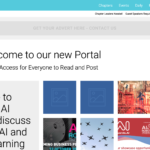@andy
active 3 years, 10 months agoApril 20, 2020
Announcing that the film documentary called “WE NEED TO TALK ABOUT AI” is Internationally released today. A balanced documentation discussing AI both now and the possibilities of AI in the future. Having a considered examination of the pros and cons (practical and philosophical) of Artificial General Intelligence and the future of humanity. I am proud to be one of the AI advisors to the director Leanne Pooley and production team for this documentary. It covered many of the aspects and concerns of developing Artificial General Intelligence, highlighting why we will only get one chance to get this technology development right, and challenges the motives of those who are currently most likely to be the ones creating and maybe controlling the Superintelligence of the future. It also discusses in detail the interaction between Human Intelligence and Machine Intelligence, and illustrates how this relationship may change as the AI becomes more advanced. Released internationally today on Amazon Prime, with a free preview link and other release dates given below: The roll out is as follows:International (excluding the USA, Australia & NZ) – April 20thThe United States – May 18thAustralia and New Zealand – August 5th And the film credits:
April 6, 2020
Since closing down the meetup groups we have seen a steady increase in members joining the online platform which is great. Why not introduce yourself on our forums or by creating a blog post on here? It would be great if we can start to introduce ourselves and share our experience and what we are looking for from here Please start the conversation and lets start talking about AI
March 17, 2020
Given the situation with the COVID-19 outbreak we have decided to close down our Neurons Meetup Groups for the foreseeable future. We have grown the Chapters network up over a number of years and very proud in the local communities we build as part of this. We also want to thank our Chapter leaders who have committed their own time and effort to support this community. We will monitor the situation and if we see demand for in person meeting in the future we will be open to setting up chapters again. However, for now we are encouraging Meetup members to sign up to the online platform and contribute to this online community. Ultimately this is the communities platform to share and exchange knowledge and support others on their learning mission to better understand the AI and Machine Learning technologies. Welcome to our new members !
March 17, 2020
The application of artificial intelligence within the healthcare industry has been relatively common for decades, with many PhD students applying machine learning techniques to various medical diagnostic tasks, but these have just been studies and typically not utilized for general usage or publicised. Only recently has the use of AI for medical applications been widely reported, with companies like DeepMind and Babylon Health, to name a few, developing medical applications and sharing publicly their advances. However, some of the publicity has been negative with concerns of individual privacy and medical data being used without the individuals’ permission. While these concerns are absolutely valid, using aggregated and anonymised data can be exceptionally valuable for certain applications. During times of crisis we must maximise our intelligence to benefit all, which is the fundamental ethos of the AI for Good campaigns that have focused on many different causes and benefits that the application of AI can deliver. Using advanced analytics to create insight and predictive models that can help us be the most efficient we can be with limited resources. While several companies are claiming to have discovered a vaccine for COVID-19, it will take many months for them to be tested and approved for use. Until then we need to find ways we can help reduce the number of deaths from the virus. There is already significant work being doing to collate useful data and research papers [1] from a number of various sources which will help in different applications against the virus. However, let us acknowledge that in times of crisis, we can leverage the powers of advanced data analytics to the benefit of the humankind. Using aggregated and anonymised data removes many of the concerns of individual privacy and gives the data science community some useful datasets that we can demonstrate what advanced predictive analytics can help with. Last week the government officials met with executives from the top technology firms at downing street[2] to discuss how AI can help the fight against COVID-19, and topics such as data sharing, fake news, drug discovery and robot cleaners where discussed. However, there are many other areas that AI can help. We are already seeing the government implement plans to help reduce the peak of cases during a short time interval. Simple simulations[3] can show how this can be achieved by putting people with symptoms into self-isolation. This will help prevent any catastrophic spikes in demand that would be completely unmanageable because it significantly outweighs the available supply of hospital beds. Ultimately, AI can be applied to many parts of any organisation, helping deliver efficiencies from the supply chain, routing of demand across the network of hospitals, diagnosis augmentation, as well as drug discovery, suggestions of medical care. But other departments in the back-office, such as finance, logistics and HR could also benefit from the use of automation and artificial intelligence, but obviously this is not a priority right now. As well as being able to accurately predict the spread of the virus and determine the number of serious cases over time, helping to manage the capacity of the hospitals is an important aspect of ensuring we can match demand and supply of care. The data science platform company H20 have been working with Stanford university, Kaiser and some other US hospitals to create a model that can help predict the capacity and demand for Intensive Care Units (ICU), this can then be used to manage the logistics around routing emergency cases to the hospitals with most capacity based on the regional predictions of cases over time. This is exceptionally important to ensure as many people falling seriously ill with the virus are able to receive the intensive care they need as soon as they need it. Working in collaboration with Combined Intelligence, H20 are now looking to bring this predictive modelling into UK hospitals as part of our joint AI for Good campaign. We are looking to connect with as many UK hospitals as possible, so please help us, as we believe this modelling of capacity and routing can save lives. H20 have pulled together an information deck on their work in this space and are happy to support UK hospitals with using their analytics, so if you are associated with a UK hospital and would like to have a copy please contact me directly and I will share with you and put you in contact with the H20 team. Please share this article with your network, we are looking to reach as many executives within UK hospitals as possible to help them with this data analytics capability. Footnotes: [1] https://www.technologyreview.com/s/615367/coronavirus-24000-research-papers-available-open-data [2] https://www.bbc.co.uk/news/technology-51851292 [3] https://www.washingtonpost.com/graphics/2020/world/corona-simulator/ [4] https://informationisbeautiful.net/visualizations/covid-19-coronavirus-infographic-datapack/
September 29, 2019
The AI & Robotics and CX Tech Conference & Expo, London, etc Venues, 200 Aldersgate London EC1A 4HD (5 min walk from St Paul’s tube)Thursday 31stOctober Event url: https://air.events 20% Discount Tickets url: https://www.eventbrite.co.uk/e/artificial-intelligence-ai-robotics-conference-expo-showcase-london-2019-tickets-53286582603?discount=NEURONS Venue Directions url:https://www.etcvenues.co.uk/files/public/directions-pdf/etc.venues_-_st_pauls.pdf AI technologies are re-shaping our future. It’s up to us to determine whether they enhance our lives or diminish them. On 31 October 2019, some of the most respected minds in AI, business change and technology/human interaction will come together to put the case for a positive AI-enabled future. They’ll consider how AI could impact the business operations, world economies and human life for good or ill and, eschewing doom laden prophecies and idealised dreams, investigate what we can do to ensure technology remains humanity’s life- enhancing servant – not its master. This event promises to be the biggest Conference we have ever run, with six parallel streams including talks, discussion panels, case studies and workshops and spotlights, together with an Expo Showcase of some of the best companies in the field of AI & CX. This event is suitable for technical leaders and senior-level business professionals involved in making key decisions about their organisation’s transformation to the new age of automation; how it’s designed, how it’s delivered and how its impact is understood. Here are some of the highlights: The Conference: You’ll find the following streams and topics included with over 30 speakers: AI Technical CX Tech Customer Experience & Business Applications AI People & Process AI Challenges Ethics and Governance Deep Learning, Tools & Frameworks Hands on Workshops AI Startup Spotlight Sponsor Showcase and much more. The Expo Showcase: You’ll find some of the best AI and CX companies demonstrating their technologies and products, including SAP, Creative Virtual, IMC and Informed AI. There will also be an AI Startup spotlight from some of the best AI universities in the UK. The AI Awards: We will be announcing the winners of the 4th Annual Achievement Awards for Artificial Intelligence at the Conference too, followed by a drinks reception. We have some amazing Industry leaders chairing the various streams, including: And some of our confirmed speakers include: Moritz Zimmerman from SAP Ross Thornley from Adapt AI Liam Ryan from Creative Virtual Julian Burnett from IBM James Sanberg from Customer Devoted Katie Gibbs from BJSS Abhijit Akerkar from Lloyds Banking Group Karl Barnfather from Withers and Rogers Rob McCargow from PWC and many more confirming every day … see AIR.Events for full agenda 20% Discount Tickets url: https://www.eventbrite.co.uk/e/artificial-intelligence-ai-robotics-conference-expo-showcase-london-2019-tickets-53286582603?discount=NEURONS
August 7, 2019
All, GET YOUR EARLY BIRD TICKET TODAY Now in its fourth year, the AI & Robotics and CX Tech Conference is going to be the biggest and best value AI Conference with six parallel streams to select from, the agenda is going to be action packed with a wide selection of topics. We are proud to announce our annual AI & Robotics and CX Tech Conference is on Thursday 31st October. This will be the biggest Conference we have ever run, with six parallel streams including talks, discussion panels, case studies and workshops and spotlights,together with an Expo Showcase of some of the best companies in the field of AI & CX. We have a very limited supply of Early Bird tickets available for the Day Pass Conference and Expo with a saving of £100on the standard delegate Day Pass. The Early Bird tickets are only available until August 17thso don’t hang around and miss the chance to save. Our AI Conference is the best value event in London, with normal conference tickets starting from £495, our standard pass is only £399. The conference venue is near St Pauls in central London, etc Venues, 200 Aldersgate London EC1A 4HD The Conference will have the following streams and topics included; AI Technical CX Tech Customer Experience & Business Applications AI People & Process AI Challenges Ethics and Governance Deep Learning Tools & Frameworks Hands on Workshops AI Startup Spotlight Sponsor Showcase and much more … We will even have an onsite bookshop to get all the latest AI related books. With company representation across a wide range of firms; SAP Creative Virtual IMC IBM PWC BT Informed AI Winning Minds Edinburgh University Oxford Brookes University UCL University Withers & Rogers GET YOUR EARLY BIRD TICKET TODAY– https://air.events/#tickets Save £100. The ticket price includes coffee breaks and lunch. AI & Robotics Conference & Expo – Thursday 31st October – Early Bird Tickets – Available NowPlease note that Early Bird Tickets are NOTavailable for the Day + Awards Pass which includes the evening AI Awards dinner and ceremony, If you want to also attend the Awards Dinner & Ceremony you will need to purchase the Delegate (Day + Awards Pass)
June 8, 2019
Join us at the next AI & Robotics Directors’ Forums hosted at the Gallup offices at the Shard the one day events cover a number of topics covering AI and Customer Experience. On Thursday 27th June we will have a focus on AI & CX Transforming Financial Services Get your Ticket Now – http://air.events/directorsforums/june2019/#tickets With a range of speakers, panel events and case study, including; Chris Ezekiel, CEO of Creative Virtual Abhijit Akerkar, AI Strategist & Business Integrator at Lloyds Banking Group Tom Castle, Head of Artificial Intelligence Practice and Development at Natwest Mark Cliffe, Chief Economist at ING Saurabh Moody Voiceman, CEO of Alphaa AI Dr Djamila Amimer, CEO Mind Senses Global and many more
June 2, 2019
Wow. I can not believe it has actually been four years since I launched our first AI related website. The progress made this past 12 months has been amazing, and demonstrates the momentum we now have. Our mission remains focused on enabling people to learn more artificial intelligence, making the subject more accessible to everyone. Essentially Supporting the AI Community. We have for the first four years been dedicated to individuals and this still remains a key part of our audience, however, we are seeing a great need to support businesses. Our Awards was always targeted to supporting AI companies, but now we need more and more traditional businesses wanting to know more about AI. Over the four years, our user base has demonstrated wonderfully encouraging organic growth. We now have close to 1,000 visitors per day to our websites from every country across the world. 6,000 members are part of our Neurons professional network with 25 groups in 15 countries and this is expanding on a weekly basis, and with nearly 100,000 followers of our various social media channels, and several thousand people subscribing to our various newsletters. We also have a great network of volunteers, from the chapter leaders of the various meetup groups, to the judges for the for annual achievement awards, and the central team that support me on many other tasks and plans. This is truly a community for the people, run by the people, and it makes me so proud to be part of it. I want to thank you all for being part of the community and ask that you share with you friends and colleagues and help us make this the best and biggest AI community. Business Focus – AI & Robotics Events (AIR.Events) Our journey to support businesses wanting to learn more about AI has really started with our acquisition of the AI events company run by CBM. These events include regular Directors’ Forums events, hosted by Gallup in the Shard, our next event is on the 27th June focused on AI & CX Transforming Financial Services. We then have AI Transforming Retail and Customer Data on the 17th July. As part of this acquisition we will also be running the AI & Robotics Main Event Conference on the 4th October. To support businesses further, we will be organising Roundtable Workshops and Dinners. Please visit our site AIR.Events If your business would like to be involved with these events in any way, please contact us via air@informed.ai or visit our website. into.AI into.AI is the main portal for individuals, providing useful information and news on AI, and links to all our other mini-sites. We want to thank everyone for their continued involvement. We are always looking for contributors, to submit stories, press releases and thought leadership articles. Sharing your news and thoughts is all part what this ecosystems is designed for, so please don’t hesitate to submit your news on our platform. We are now also creating our own unique stories, articles and papers, which we hope you will enjoy. This exclusive content will also be shared as part of our newsletters. We have a regular spotlight for those AI companies / startups that want to showcase their new products to the community. Totally free method of promoting yourselves. We have also featured individuals who have authored books for example. Shared.AI One of our newest sites is Shared.AI, this is a simply site that allows individuals and companies to submit a range of different AI related information, from links to companies and products to news and press releases. This allows a single place to submit useful information that will be shared across our network. It also has a blog of the most recently submitted items. Awards.AI The AI Awards, have been a huge success on a global scale, we have already awarded over 60 winners of the AI Awards. Having now entered our third year, we are making it a much bigger programme of events throughout the year. Currently still open for nominations, across 60+ categories of awards, the judging and showcases will occurring in the coming months at various locations, with the awards ceremony happening in late November / early December. The Awards are still open for nominations, visit Awards.AI to submit your nomination before 1st July. This is the Oscars of the AI tech world, the only independent AI Awards. Neurons.AI and Chapters.Neurons.AI We continue to grow our Professional Network for AI Practitioners and Researchers call Neurons. This is a mix of both online and offline interactions, with meetups, forums, user blogs and messaging. This platform allows us to facilitate the knowledge sharing between organisations, allowing us all to benefit from the open developments of this field. We have just launched a new online portal for Neurons.AI and will be combining the chapters site into it very soon. This update will allow us to add more functionality over the coming weeks and months. We have over twenty Chapters in 15 countries around the world, and continue to grow the number every month. If you would like to lead a chapter in your City, please let us know. Our next London meeting is on the 28th May … so please come along … https://Chapters.Neurons.AI/UK/London Events.AI Now listing over 200 AI related events, conferences, meetups, one-day events and webinars. With the largest list of discount codes for AI conferences in one place. It is the goto place to see what events are running. Many of the large conference organisers list there events on our site. Vocation.AI We are actively looking to acquire a recruitment company to help us develop and grow our capability around our careers portal and jobs board. Showcase.AI Our newly acquired AI & Robotics Conference will become the AI Showcase in 2020 and we will have two conferences one in London and another in Edinburgh. In 2021 we will look to expand this to include an international conference. Management Team & Advisory Board We are starting the process of getting a management team and advisory board together. This is a critical part of our development as a group, allow us to increase our offerings and to make our products and services more advanced. This marks a new phase of maturity for us, and a significant change to our business structure and organisation. This will also allow me to transition more responsibility to a wider team and removing myself as a potential bottleneck. I can then focus on more advanced and new products and services while the team ensure the current platform is stable and continues to grow. We are also actively looking to establish a global advisory board, if you are interested to join, please let us know via our contact us page Having a management team is combined with our strategy of growth by acquisition, with one acquisition already executed this year and two more planned. Sponsorship Our main challenge with this ecosystem, is that there is so much more we would do with the platform, given more time and resources. We have a number of sponsorship opportunities across the platform, including the Awards, Neurons and our Events. If you would like your company to be associated with the great work we are doing with this ecosystem, please contact us for more details. In addition we have a number of additional projects and sites in the planning stage which we will be launching in the coming months, which will add new capabilities to our portfolio of sites. Volunteers Needed We are always looking for more help and support from volunteers. We need more chapter leaders, and co-leads for each chapter, with additional support for each too. Much more help on content for many of our sites, from blogs to structured updates on specific sites. We really need alot of help here. Please contact us to find our more. Partners & Sponsors Partnerships, Sponsorships and Business Development are all areas we need to extend and develop over the coming months. We would appreciate any help from people who believe they can contribute to these areas for us. We Value your Support Feedback and Comments As always, your feedback is welcomed and encouraged, as we want to make sure we are delivering useful sites and functionality. The best way to do this is email us at talk@into.AI Thank you for your continued support and encouragement. From the Informed AI Team Our group of websites includes: http://into.AIhttp://Neurons.AI http://Chapters.Neurons.AI http://Awards.AI http://Events.AI http://Showcase.AI http://Vocation.AI http://Study.AI http://Informed.AI Our social media: @into_AI@Awards_AI @Events_AI @Showcase_AI @Vocation_AI @Neurons_AI @Informed_AI We also have facebook pages and our Informed.AI LinkedIn page. With thanks Andy Prof Andy Pardoe Founder of the Informed.AI Group Pardoe.AI @Pardoe_AI
May 27, 2019
We are very pleased to announce the launch of a new portal for Neurons.AI. This is the foundation for us to build additional functionality over the coming weeks and months, with a focus on delivering more content, both from our own portfolio of websites but also from user driven content too. There is a lot of functionality available to users include; Extensive User Profiles that allow you to share your AI interests and expertise with other members. Users can submit blogs, articles, news stories and press releases to be shared with the Neurons.AI and Informed.AI community. A forum area to post questions or answer others. We will also be combining our chapters website into the our main portal at members.neurons.ai over the coming weeks too, allowing easy access to information about our network of meet-up groups as well as all the online content too. We have already included an Events section that lists all the eventbrite details from our various Chapter events. We will be migrating the chapter pages over time too. We already have over 700 members of the site now, and are looking forward to growing this much more over the coming weeks and months. As always we welcome your comments, feedback and suggestions, please visit our site and goto our Contact Us page.
November 24, 2018
Technology has always been a driver in advancing forms of warfare, from spears and arrows to nuclear bombs. But with rapidly evolving technology, from drones to biotechnology, the way humanity wages war is about to change considerably. The changing face of warfare is a double-edged sword. Technology, as a whole, is about improving efficiency and in warfare, this may mean that fewer human troops are required on the battlefield. More accurate and sophisticated weaponry may mean fewer civilian casualties, and – with human troops out of the equation – fewer mistakes made as a result of exhaustion and stress. That’s the good news. Nonetheless, war is, to understate massively, never pleasant. There is a chance that advancing and automating warfare could lead to even more problems. This is a view shared by minds such as Stephen Hawking and Elon Musk, who famously both signed an open letter calling for a ban on autonomous weapons in 2015. So, what different types of weapons are being advanced as part of this new technological era? Drones In January 2017, the US Department of Defence announced a successful demonstration of a swarm of autonomous micro-drones. 103 of these drones worked together, demonstrating decision-making, self-healing, and the ability to fly in adaptive formation. Currently, the anti-air defences and missiles we have in place do not have the capacity to track devices the size of these micro-drone swarms. Whilst larger drones are limited by radar observability, stealth tech in the form of these smaller, autonomous aerial drones have the potential to cause serious damage. One flaw, however, may be the level of battery life needed to keep these micro-drones going for as long as they’re needed. Tiny drones are not the only development in drone technology with the potential to alter the face of warfare. BAE Systems has recently announced plans, in association with the University of Glasgow, to “grow aircraft and some of their complex electronic systems, conceivably from a molecular level upwards”. Using environmentally sustainable materials, such UAVs will be chemically composed over a matter of weeks (as opposed to months). They will be able to travel at high altitude, at speeds exceeding those of adversary missiles. Robots From aerial robots to those on the ground. Robot ‘soldiers’ are the main technology that could reduce the number of human ground troops required. Autonomous vehicles and weapons will be able to identify and attack targets using pattern-recognition algorithms, with scarcely any human intervention. They could also identify wanted individuals and pull the trigger on authorisation. Increased risk determination and fewer mistakes could reduce civilian casualties. But what happens if something goes wrong? That’s a question that needs addressing, and the one that Musk and Hawking, along with 1000 other signatories to the aforementioned open letter, are calling for. Self-guided bullets and smart bombs are also coming. DARPA has developed these bullets to follow and strike moving targets, and smart bombs which use cameras and sensors to guide themselves towards targets. Biological Warfare The production of biological weapons is banned. But, as we all know, that doesn’t stop some from developing them anyway. Biological weapons, such as explosive devices or fitted missiles, containing disastrous viruses such as Zika, could have pandemic consequences. However, more worrying still could be the misuse of gene editing technology Gene editing is one of the greatest technologies currently being worked on. It is being developed to reduce mortality from particular diseases and better functioning human organs. Great work, indeed. But in the wrong hands, it could spell disaster for the human race. Killer swarms of insects, such as mosquitos, could be engineered using CRISPR technology. Equally, CRISPR could be misused to create viruses that attack human DNA, causing harm not just to the current generation, but those to follow. If this all sounds a bit alarmist, then we apologise. Counter technologies are, of course, being developed to contain such risks. Extensive cybersecurity advancements, sensor technology, and tech such as VR and AR to train military personnel, are also on the cards. There is, as with any technology, a lot of fear of the unknown. The capacity for mistakes, or for highly advanced technology to fall into the wrong hands, is something we need to talk about. On the flipside, however, such advancements could actually improve (for want of a better word), the way we combat enemies and defend our own futures.
October 2, 2018
AI & Robotics Conference co-located with CXtech conference, 12 October, London This year we have partnered with the AI & Robotics Conference to Showcase a number of our shortlisted nominated companies across a number of the AI Awards categories. Come and see their products being demonstrated. We will even be awarding an additional Best in Show Award on the day. See How AI is transforming business and customer experience Awards AI has secured a discount of £300 Final price is £295+ Vat and includes access to both events, refreshments, lunch, networking reception, printed programme and access to the Awards AI Showcase. Use code AWA295 Apply for tickets Here On 12 October, AI & Robotics and CXtech, two co-located conferences and an interactive solutions showcase, will reveal how AI and advanced technologies are transforming business and customer experience. They will bring together world leading experts in AI and CX in a programme that is already attracting senior business users from national and multinational organisations. Hear from Amazon, TSB, easyJet, TCS, Ordnance Survey, National Express, RBS, NewDay, Two Circles and others, on what lessons have been learnt so far on the impact and implementation of AI and automation on businesses, customers and employees VIEW AI & Robotics Programme VIEW CXtech Programme
September 30, 2018
Earlier this year, reports emerged that Devon and Cornwall Police are launching the first 24-hour police drone unit in the UK. With falling police numbers in the UK, and cuts to funding, this news may be just the beginning in a new era of law enforcement. 21 other forces are already experimenting with drone technology to carry out duties from everyday search missions to security surveillance on Royal outings. Cheaper than helicopters, and able to perform some of the same tasks as officers themselves, police drones may be just one avenue of technology coming to policing in the very near future. One helicopter flight currently costs, on average, £1,266. A drone, on the other hand, can be purchased for around £1,000, with minimal running costs beyond the obvious need to charge. However, the move has prompted inevitable questions regarding privacy, as well as concerns over whether the intention is to reduce numbers of human police to keep costs low. Of course, the hope is that employing drones for certain tasks will be a move to more efficient policing, allowing officers to concentrate on other necessary duties, thus freeing up resources. Drone footage has already been used in court proceedings, more for visualisation of a crime scene for jurors than of crimes themselves at this point. But could this be taken further without privacy implications for the general public? That’s up for debate. For a great rundown of the pros and cons of drones in law enforcement, check out this article by Drone Guru. Robot Police Drones, nonetheless, are not the only technology finding its way into law enforcement. In Dubai, the first robot police officer has already been revealed, charged with the task of patrolling malls and tourist attractions in the city. It will be used to report crimes, to pay parking fines, and to gain local information through the use of a touch screen on the robot’s chest. Data collected by the ‘Robocop’ will also be used to inform transport and traffic authorities. “It can protect people from crime because it can broadcast what is happening right away to our command and control centre,” director general of smart services at Dubai Police, Brig Khalid Al Razooqi, told the BBC. Dubai has announced plans to make 25% of its police force robotic by 2030, with the caveat that they will not replace human officers, only add to their numbers. In the US, law enforcement teams are taking the whole ‘Robocop’ thing one step further, as you might expect. The Robotics Business Review reportedin February 2017 of a case in Los Angeles where a robot was used to apprehend a suspect. After a six hour standoff, cops sent in a robot to find out what was going on behind the suspect’s makeshift barricade. From a video feed recorded by the robot, police were able to seize their opportunity to advance, whilst the robot rolled in and grabbed the suspect’s weapon. Nobody was harmed, and the suspect was peacefully apprehended. The driving factor behind the use of robots in law enforcement, according to Sgt. Brian Danielsof the West Covina Police Department, is officer safety. As well as their uses in apprehending suspects, robots in the form of remotely operated vehicles (ROVs) can be used in marine situations. When retrieving bodies from plane or boat crashes, or other marine incidents, there are some underwater locations that are too dangerous for police divers to access. Robots can also be used to deliver mobile phones in hostage situations, and for scouting locations ahead of SWAT team deployment, as well as, of course, bomb disposal. Military Drones As for military uses, drones are coming hard and fast. The US Department of Defence successfully demonstrated the deployment of an autonomous swarm of micro-drones in January 2017. These self-healing, decision-making drones fly in adaptive formation, and have the capacity to inflict serious damage whilst flying under enemy radar. Tiny drones have been on the battlefield for several years now, such as the Black Hornet, which soldiers use to look over walls and around corners. The Black Hornet has been working in Afghanistan since 2013. It can currently fly for 25 minutes on one charge, with a digital data link to its terminal of up to one mile. It has also recently been augmented with night vision and infrared sensors. Though one of the most infamous military mini-drones, the battery life of the Black Hornet pales in comparison to that of the FULMAR, for example, which can hover for up to 12 hours. As well as the capabilities of military drones, battery life is the key factor in how useful drones will be on the battlefield. The swarms of micro-drones trialled by the US Department of Defence are serious stuff, but if their batteries don’t last as long as necessary, they are basically useless. Robots in Warfare Robots, too, are obviously making their presence felt in the military space. Robot soldiers could have a positive effect in terms of reducing the numbers of ground troops required in war zones. Autonomous robots are also being developed that use pattern-recognition algorithms to identify and attack targets, thus allowing the identification and destruction of wanted individuals on authorisation from remote human teams. Then, there’s smaller robot warriors, such as the Guardian S snakebot, which works as an agile surveillance agent to conduct inspections in confined spaces or hazardous areas, help with search and rescue operations, and in assistance of SWAT teams and bomb squads. The wealth of robots of all shapes and sizes being developed for warfare are too numerous to list here. Suffice to say, it’s big business. Concerns Whilst we’ve taken a good look at the potential that drones and robots have in law enforcement and military applications, there is another side to the issue. And it’s one that is of significant concern to many tech experts and rights campaigners. The notion of robots as unstoppable killing machines is a trope in popular culture that’s been around ever since Czech writer, Karel Čapek, introduced the word ‘robot’ into the popular consciousness with his play, R.U.R. (Rossum’s Universal Robots) from 1920. Stoked by the fires of technological advancement, the fear of robo-pocalypse is looming large in the minds of the general public now more than ever. This is, of course, exacerbated by Elon Musk’s insistence that robots will kill us all. Nonetheless, these concerns do not arise from nowhere. The concern over autonomous vehicles in warfare and law enforcement raises salient points, points that are leading to experts such as Prof. Stephen Hawking (and, yes, Elon Musk) insisting on a ban. The risk that autonomous weapons, of which robots and drones play a large part, could fall into the wrong hands, be hacked, or malfunction in some way, is one that we should be taking deadly seriously. That being said, warfare has been evolving since the dawn of time… perhaps this is a simple progression, and we can only hope that the powers that be are taking safety as seriously as we all hope.
September 23, 2018
We are very pleased to announce a partnership with the AI & Robotics The Main Event Conference who will be hosting our first ever AI Awards Showcase for shortlisted companies on Friday 12th October in London to demonstrate their AI products before our Awards Judges. This is a new feature of our Awards this year, and we are really looking forward to being able to showcase a selection of shortlisted companies in October before we announce the Awards Winners in December. We are very excited with this Showcase Event and will be awarding a very special Best in Show Award on the day to the product the Judges view as standout on the day. Visit Awards.AI for more details
September 23, 2018
We already know the stories of people who have become so immersed in videogames that they have paid the ultimate price. These poor individuals have stopped sleeping, eating, visiting the bathroom; they have not attended to any of their bodily needs for so long that they have died. Worse still are the stories where people have failed to attend to their children, like the South Korean couple who became so addicted to caring for a virtual child that their own infant starved to death. So, we know videogames can be deadly addictive. Could virtual reality be even worse? For most people, even an all-night videogame binge session can be brought to a swift end by the interference of appetite, a phonecall, or the dog fussing for its morning walk. Add whole-immersion virtual reality gaming to the equation and those interferences become much easier to ignore. Addiction comes in many forms, and for some people, it’s not so easy to break away. Particularly when something offers utopian escapism; a way to forget the troubles of an unsatisfying life and disappear into a more beautiful, easier, trouble-free life. No matter if it’s made of pixels, if it beats the burden of being alive, it’s a better place to be. Dopamine, the neurotransmitter that creates feelings of pleasure, excitement, creativity, and engagement with the world, is released whenever we take risks or encounter novelty. It’s also strongly linked to reward-gratification. The desire to get more of the reward that caused the dopamine release can become highly compelling. This desire is behind the addictive nature of dopamine-releasing cocaine. Videogames are, simply put, dopamine dispensers. But what of those other pleasure-inducing neurotransmitters, serotonin, anandamide, endorphins, norepinephrine? Well, standard videogames are mostly just dopamine dispensers, as I said. Nonetheless, as our capacity to create more sophisticated gaming systems (i.e. VR), grows, there’s no reason to doubt that we’ll be able to more strongly tune in to how to control and manipulate the release of these neurotransmitters. Of course, it’s not just virtual reality gaming that could lead to unhealthy levels of immersion. Facebook is famously making moves to become more virtual. Like screen-based Second Life, where participants could meet friends and build a virtual life, social media could open the doors to a whole new way of socialising. This will be great news for the elderly or those unable to leave their homes; for socially isolated people in general. But the same issues around addiction apply here. Many of us already check Facebook several times a day, and it tends to be the more isolated amongst us that are susceptible to clogging up our friends’ news feeds. There’s a great deal of therapeutic potential here, but unless we continue to take those relationships into the real world, plugging in will remain a lot more pleasant than logging off. So what happens when virtual reality becomes the most pleasurable thing in our lives? And how do we curb addiction? One of the most obvious solutions would be to impose a time limit on device use. After, say, four hours, the system shuts down with a message to go and get some food and exercise. But then again, there’s an equally obvious way around that – have multiple consoles. Expensive, but for addicts, an easy solution. Another solution might be to stick adverts into games at hour intervals. Frustrating ten minute ad breaks would break gamers’ flow, but may help them to disengage for a while. Especially if those ads included a warning about the dangers of VR addiction. Physically, however, the pleasure derived from virtual reality may be curbed somewhat by the physiological side effects encountered by users. Motion sickness is still a problem that both hardware and content creators need to overcome with VR. But there’s also fatigue. Videogames can be mentally draining, but as VR games tend to be more physical, with more movement required, getting physically tired is a normal result of a long session. Other than these possibilities, there are some serious difficulties facing how we will prevent VR addiction as the technology becomes more widespread and sophisticated. Perhaps the answer lies in giving people a greater quality of life in the real world, which is something technology has the power to do. But all the time that another world is better than the real one, society will have to deal with addiction and its consequences. All we can do is try to help as best we can.
September 17, 2018
Rolls-Royce is looking for tech talent – graduates, developers, data scientists, and computer vision startups to build an automated decision-making system for inspection processes. A two-day hackathon on October 15-16 in Sheffield in the heart of AMRC Factory 2050. A chance to work with Rolls-Royce, win a cash prize of £10,000, and access to top-level mentorship experts. Numerical datasets will be provided to train your models on. Register today! http://bit.ly/2O6z4MN #RollsRoyceHack
September 9, 2018
All, I would really really like your feedback on Neurons, especially how we can make the online portal more engaging to yourselves. The online portal is in part to support the chapters and the local communities that are forming around each chapter, but it is also about building a global community and platform for communication that supports all the other websites and activities that are part of Informed.AI, these include into.AI, Awards.AI and Events.AI to name a few. I have already said that this is a community platform for the community by the community and I am very keen to hear peoples feedback. I held a roundtable forum a few months ago, to allow people to help input into the direct of the platform, and will do more of these on a ongoing basis, but people can also give me feedback direct via email at andy@informed.ai Help us make this a place that is useful to us all.
September 9, 2018
Wouldn’t it be cool if non-player characters were more interactive? What if they were almost like real people? With artificial intelligence developing at speed, developers are beginning to consider this as a real possibility. Well, I say ‘beginning’. In fact, AI has had a part to play in gaming for a while now. Perhaps one of the most well-known early examples is The Sims, which, in terms of its use of artificial intelligence, was actually way ahead of its time. Indeed, it has continued to use more and more sophisticated algorithms to drive character behaviour with each new version. Lots of smaller, indie games have used AI in interesting ways to tell stories and build emotional engagement. Games like 2012’s Prom Week, developed by the University of California Santa Cruz, and the rather odd 2005 game, Facade, were experiments of some note in this field, of which Prom Weekin particular is a very interesting example. Prom Weekused AI to build on second-by-second social data, creating unique interactions between particular characters depending on their individual personalities. It’s well worth reading about, if AI in gaming is something that interests you. As a natural progression, simultaneous to the developments we are seeing in the AI world at large, the possibilities for identity for non-player characters in videogames are growing exponentially. There’s just one question: do players really want AI-driven NPCs? The main use for AI in videogames at the moment is to control and direct NPCs around the player, whether as enemy targets or non-player team members. Is there any need for emotional, lucid non-player characters if this is all they are expected to do? Now and Next Considering the complex and time-consuming nature of developing algorithms for this purpose, games developers need to be quite certain that doing so adds something significant to the gaming experience. It’s never really been a priority to use AI for characterisation in much depth for most big games developers, but having said that, the gaming space is changing – particularly with virtual reality technology promising a new era on the horizon. With these changes in mind, it pays to assess what gamers are going to be looking for in these more immersive games of the future. We’ve already seen the design of games shift away from linear narrative adventures over the last five years or so, towards open-world games with greater capacity for emergent stories gaining in popularity. The Times They Are A’ Changin’ Recognising that vacant NPCs who add nothing to the game open a chasm in the way of immersion, gamers have begun to express a preference for games where their existence in the game world is both registered and acknowledged by the NPCs within it. A good example is Middle Earth: Shadow of Mordor, developed by Monolith Productions. The game’s ‘Nemesis’ system meant that the computer-controlled enemies remembered previous fights with the player, which were then brought up in later encounters. Despite the relatively unsophisticated AI required to do this, players of the game reacted positively to the sense of permanence and agency the Nemesis system inspired. Take this one step further, and imagine a version of, say, Grand Theft Auto, in which the missions don’t just come via the main narrative, but are also generated through countless conversations, drives, and desires of the NPC civilians that wander the streets of the game. What if each of those individuals was endowed with their own full character, personality, and backstory? It seems like an insurmountable drain on memory resources by our current standards. But things are developing in this regard, too. Just think of how little memory there was in your old Commodore 64, then your SNES, your PS1, and now in your XBox One. Memory grows. There’s increasing amounts of space for such multi-faceted, multi-layered narratives powered by artificial intelligence. James Ryan and the Expressive Intelligence Studio At the University of California Santa Cruz, where Prom Weekoriginated, a team at the Expressive Intelligence Studio is doing some fascinating work on building an AI platform for gaming. Talk of the Town, so the platform is named, creates interactive experiences with (artificially) intelligent characters with their own ongoing personalities – their own beliefs, emotions, relationships, and memories. The project is headed by PhD student, James Ryan, and represents perhaps one of the most intense studies in the area of AI videogame characters. Three different AI elements power the Talk of the Town platform. Firstly, natural language generation (NLG), which takes its cue from the dialogue manager’s decision about how to respond, and generates a line of appropriate dialogue. Then there’s the natural language understanding (NLU) system, the most complex element, which is being developed in collaboration with Adam Summerville. It converts what the player has said into a form for the dialogue manager to process. The dialogue manager, in turn, makes decisions on how the world should be changed as a result of the player’s words, along with how the NPC should respond. This is, of course, powered by neural networks. James Ryan’s work is ultimately intriguing because of the dedication he is putting into getting AI to clearly understand and process input and generate a very human landscape of characters. Every action has a knock-on effect on other NPCs, the player’s experience, and the game world in general. He’s essentially trying to recreate AI-powered gaming worlds as close to human life as possible. Separate from Ryan’s work, Google DeepMind has just announced WaveNet, a tool that can generate highly convincing human speech. We may be close to having AI characters in games that can actually speak their minds and affect the course of the game accordingly. It’ll start out rudimentary, of course, but will certainly grow more sophisticated as the technology evolves. If the gaming world changes in this direction, we can expect games that are so immersive that they can rival real life on many levels, particularly when realised through the medium of virtual reality. Does HBO’s series, Westworld, spring to mind, perchance? For a thorough and fascinating article on the use of AI in videogames, we highly recommend this, by The Guardian: Video games where people matter? The strange future of emotional AI(October 2016).
June 17, 2018
All, We are celebrating our 3rd Anniversary with a Summer Party on Tuesday 19th June, 6pm. A free event that is purely a networking opportunity, so come and meet others working in the industry of AI and celebrate with the founder of Neurons.AI and Informed.AI, Dr Andy Pardoe. Our third anniversary is a great milestone for the development of the ecosystem we have build, so come and celebrate the success. The platform has been growing at pace, with new groups being added very month. Please feel free to join us For more details and to reserve your place please visit http://Chapters.Neurons.AI/UK/London/
May 22, 2018
I am very pleased to announce that we have decided to open up the platform so anyone can read the content posted on the site from user blogs and forum posts. This should make the platform more accessible to everyone, and mean that you only need to sign-up and login if you wish to post content to share with others. We hope this makes the platform more useful for most people that are just interested in reading others points of view. As always we appreciate people’s feedback and are looking to make this and the rest of our AI ecosystem as useful as possible for everyone.
April 4, 2018
I hope you had a lovely Easter holiday.Just a quick reminder that our next London Chapter meeting is scheduled for the Tuesday 10th April 6pm to 9:30pm. We have the best lineup of speakers with Dr Janet Bastiman and Aric Whitewood, so it promises to be a fantastic evening. Plus Andy will talk about a new framework he his designing to help measure the progress of AI. For more information and to Reserve your Ticket please visit http://chapters.members.neurons.ai/uk/london/ Tickets will need to be shown at the door. at Henry’s Den Finch’s Bar 12A Finsbury Square London EC2A 1AN Agenda 18:00 – 19:00 – Drinks and Networking 19:00 – 19:10 – Welcome and Intro by Andy 19:10 – 19:40 – Guest Speaker #1 – Dr Janet Bastiman 19:40 – 20:10 – Guest Speaker #2 – Aric Whitewood 20:10 – 20:30 – Dr Andy Pardoe “The Continuum of Intelligence” 20:30 – 20:45 – Open Mic 20:45 – 21:30 – More Networking, Drinks and Discussions Speaker Profiles – Dr Janet Bastiman is Chief Science Officer at Storystream where she heads up the AI division. She has extensive experience in leading teams and building AI systems. With over 10 years experience at C-level, she has taken abstract concepts to innovative scalable products at multiple companies. A STEM polymath, Janet brings multidisciplinary ideas to the departments she leads, forming cutting edge research teams with an eye on delivery that is rarely seen. She has a bachelors and masters degree in Molecular and Cellular Biochemistry from Oxford, and her PhD was in the field of Computational Neuroscience. Janet is a co-founder of the Tech Women London Meetup group and regularly speaks and writes on various technical subjects. She blogs on maths and technology at http://janjanjan.uk. Aric Whitewood is the founding partner of WilmotML which combines machine learning and AI techniques with an established macro and risk appetite framework, in order to provide advisory services and to create new investment products. Previously Aric and I worked together at Credit Suisse, where Aric was the Head of Data Science for Client Analytics based in Switzerland.




















